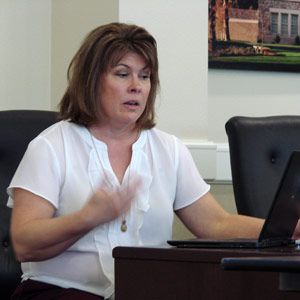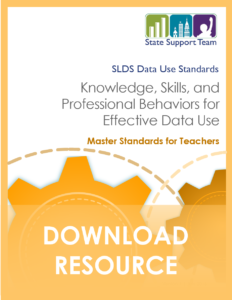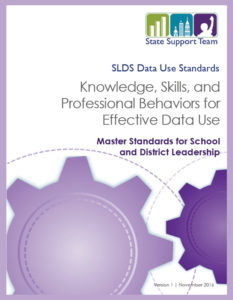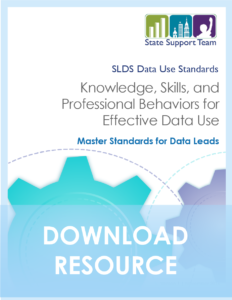Workshops on Data and Assessment Literacy for Leaders
Fifteen workshops covering the use of data by leaders when planning, interpreting assessment results, or evaluating your schools’ or district’s vital signs. Workshops are role-specific. Click below to see the workshops designed for each role.
Accountability 101
Accountability reporting fundamentals
Schools’ and districts’ reputations are rising and falling based on their accountability reports. Yet the skills required to do it effectively have not been codified and conveyed to those responsible for doing that work. You’ll learn how to do this effectively, and what a difference good reporting can make.
Accountability 102
Impact of accountability reporting
Enrollment and reputation of your schools and district are affected by accountability reports. Learn what happens to your accountability reports once they are published. Includes parent choice scenarios, and their search for facts that influence their decisions. Includes review of other sources of school information.
Accountability 103
Mismeasurement of schools’ and districts’ vital signs
Whether or not your school or district has landed in differentiated assistance, it’s time to review the limits of the Dashboard. We will review the roots of mismeasurement, and show you other approaches that enable you to see your school’s or district’s vital signs in a new light.
Accountability 104
Accountability reporting fundamentals
Schools’ reputations are rising and falling based on their accountability reports. These SARC reports are under your control. Is your team taking full advantage of this opportunity to tell your schools’ stories effectively? Learn what a difference good reporting can make.
Accountability 105
Mismeasurement of schools’ and districts’ vital signs
Whether or not your school or district has landed in differentiated assistance, it’s time to review the limits of the Dashboard. We will review the roots of mismeasurement, and show you other approaches that enable you to see your school’s or district’s vital signs in a new light.
Assessment 101
Interpreting assessments
Test results are uncertain, and human judgment is fallible. Yet, handling that uncertainty properly can improve the quality of human judgment. Learn the assessment fundamentals that will boost your team’s assessment IQ and help them make wiser decisions.
Assessment 102
Reporting assessment results
Assessment results are frequently misunderstood by everyone – staff, leaders and parents – and one culprit is poor quality reporting. Learn the do’s and don’ts of assessment reporting. Understand the roots of those misunderstandings. Discover how easy it can be to avoid these hazards.
Assessment 201
Interpreting assessments of student results
Ambiguous evidence of student learning is the rule, not the exception. Yet you and your teachers must make decisions about student assignments based on this evidence. Learn how to tame that ambiguity, and make those tough decisions with the best quality evidence in hand.
Assessment 202
Interpreting assessments of school or district results
Planning requires a firm grasp of the soft meaning of test results. It also requires that the progress of the same students over time be measured. Learn how to make reasonable claims of the progress of student learning in your school or district. Smarter plans will be the result.
Measurement 101
Leading your district to measure wisely
Knowing what measurement skills each member of your cabinet should master is half the challenge. Knowing the right questions to ask them is the other half. We bring a retired superintendent and an analyst to this workshop.
Measurement 102
Telling data stories persuasively
Leaders who hold high quality evidence in hand still need to learn how to persuade others. There’s an art and a science to data story-telling. We’ll teach you how to do it, so you can tell memorable stories in front of any audience that are persuasive.
Measurement 103
Choosing the right analytic methods
Your staff needs more than a mantra to use “multiple measures.” They need to know how to use those measures, and what to do when those measures conflict. Gap analysis and year-to-year change measures require more than simple subtraction. Learn the right way to derive these key measures.
Planning 101
Planning with evidence: school plans (SPSAs)
Good site plans depend upon sound evidence of schools’ strengths and challenges. We’ll review the quality of evidence and measurement methods used in site plans. And we’ll guide principals to become better judges of the quality of evidence they use, and better forecasters of outcomes.
Planning 102
Planning with evidence: district plans (LCAPs)
District leaders can’t be expected to write smart LCAPs without sound evidence and solid methods. We’ll enable planning teams to become better judges of the quality of evidence they use, and better forecasters of outcomes. And we’ll help them avoid the risks of relying too much on faith when projecting improvements.
Planning 103
Planning with comparative visual evidence
When you see the vital signs of your district or school in the context of others whose students are very much like your own, you may be very surprised. Learn to see those vital signs with fresh eyes when you expand your visual vocabulary. See progress of test results redefined in a way that makes sense.

Principals
Your site leaders set the standard for data literacy and assessment savvy to their staff. And they depend upon those measurement skills when they write their site plans. We can teach them these skills, so they can write smarter plans, and share what they’ve learned with their staffs.
District leaders
Your assessment leader is going to be far more valuable if she can bring better interpretive support to principals. And assistant superintendents of Ed Services and C&I will become stronger planners and evaluators of programs if they command stronger quantitative and analytical skills.
Board members
They’ll be voting on plans and policies based on their understanding of what the numbers mean. After a board study session designed to boost their level of data literacy and assessment savvy, they’ll be better prepared to cast their vote where the evidence is most persuasive.

Click to read Glen’s letter of reference
Instructors: Who is in Our Delivery Team
Everyone is a senior level expert. Their zones of expertise are complimentary. And their track records are evidence of leadership in their fields. We’ll bring two of our team to your district to deliver workshops that work. Move your mouse over their photos to learn more. Full curricula vitae are available on request.

Michael O’Neill

Howard Herl

Jenny Rankin

Stanley Pogrow

Jill Wynns

Steve Rees


Evidence of Impact
Case Studies
Reference Letters
Gallery of Resources
Example of our instructional materials
Why superintendents see test results differently than principals and teachers.
We wrote and produced this animation to spark discussion in our workshops. It contrasts the use of test results to compare schools, with the use of test results to infer the progress of students. Accountability conversations and instructional talks require different metrics.
Different perspectives on progress can lead to a lot of confusion between district leaders and principals. This video shows how much information about student results gets lost when averages and cut-score measures are bandied about, without showing the variation of individual students’ results.
Learning objectives: Master Standards for Data Use
We are building the knowledge and skills of your team, aiming to meet the Master Standards for Data Use. Education leaders have a role-based version, and data leads have another. These were drafted in 2015 and 2016 by a multi-state consortium, under the auspices of the Institute for Education Science.














